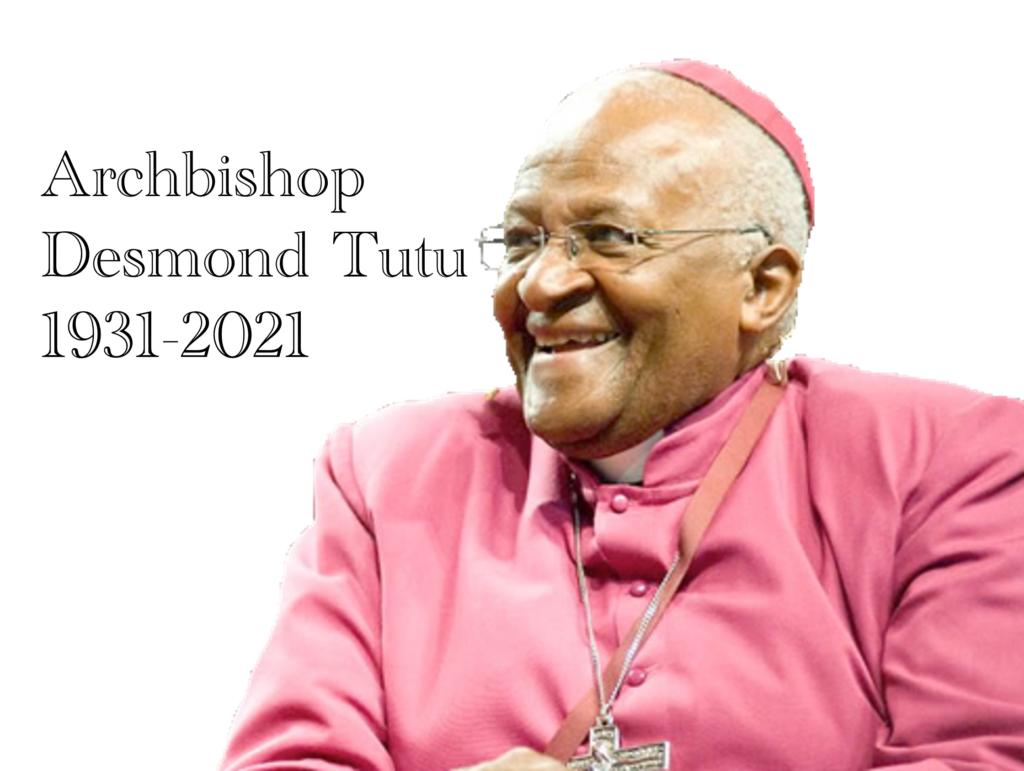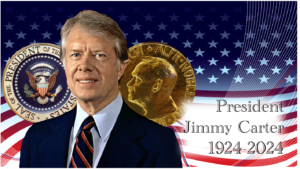I was very sad to learn of the passing of Archbishop Desmond Tutu. He was a great man whose activities had particular meaning to me when I was a student at the American University’s School of International Service in the early 1980’s. The 1980’s were a critical period during which Tutu was a strong advocate for non-violent activism. In 1984, the year he won the Nobel Peace Prize, I was in my last year of school. And, like many others, the struggle against Apartheid was on my mind as well as the minds of my classmates and professors. As his Nobel Prize attested, Tutu’s type of compassionate, non-violent, ethical leadership was exceedingly effective. That kind of leadership is sorely needed in today’s society.
It has been pointed out that his laugh was contagious; however, his fight for freedom and human rights was deadly serious. The world is a better place because Archbishop Desmond Tutu lived in it. Andrew Harding, BBC’s African Correspondent, writes, “It is impossible to imagine South Africa’s long and tortuous journey to freedom — and beyond — without Archbishop Desmond Tutu. While other struggle leaders were killed, or forced into exile, or prison, the diminutive, defiant Anglican priest was there at every stage, exposing the hypocrisy of the apartheid state, comforting its victims, holding the liberation movement to account, and daring Western governments to do more to isolate a white-minority government that he compared, unequivocally, to the Nazis.”[1]
As Harding points out, Archbishop Tutu didn’t take a well-deserved rest when apartheid was finally overturned. “When democracy arrived,” Harding explains, “Tutu used his moral authority to oversee the Truth and Reconciliation Commission that sought to expose the crimes of the white-minority government. Later he turned that same fierce gaze on the failings, in government, of South Africa’s former liberation movement, the ANC. Many South Africans today will remember Tutu’s personal courage, and the clarity of his moral fury. But as those who knew him best have so often reminded us, Tutu was always, emphatically, the voice of hope.” Not every celebrity receives global tributes when they pass; however, Archbishop Tutu was recognized around the world as a man of courage and character. Journalist Marilyn Berger notes, “His moral leadership, combined with his winning effervescence, made him something of a global celebrity.”[2] When Tutu received the Nobel Peace Prize, the selection committee provided this brief biography:
“Tutu was born in 1931 in Klerksdorp, Transvaal. His father was a teacher, and he himself was educated at Johannesburg Bantu High School. After leaving school he trained first as a teacher at Pretoria Bantu Normal College and in 1954 he graduated from the University of South Africa. After three years as a high school teacher he began to study theology, being ordained as a priest in 1960. The years 1962-66 were devoted to further theological study in England leading up to a Master of Theology. From 1967 to 1972 he taught theology in South Africa before returning to England for three years as the assistant director of a theological institute in London. In 1975 he was appointed Dean of St. Mary’s Cathedral in Johannesburg, the first black to hold that position. From 1976 to 1978 he was Bishop of Lesotho, and in 1978 became the first black General Secretary of the South African Council of Churches. Tutu is an honorary doctor of a number of leading universities in the USA, Britain and Germany.”[2]
Although that short paragraph underscores how driven Tutu was during his life, it fails to capture either the hardships he endured or the joy he generated. Berger notes, “For much of his life, Archbishop Tutu was a spellbinding preacher, his voice by turns sonorous and high-pitched. He often descended from the pulpit to embrace his parishioners. Occasionally he would break into a pixielike dance in the aisles, punctuating his message with the wit and the chuckling that became his hallmark, inviting his audience into a jubilant bond of fellowship. While assuring his parishioners of God’s love, he exhorted them to follow the path of nonviolence in their struggle.” In its tribute to Archbishop Tutu, the Nelson Mandela Foundation stated, “He was an extraordinary human being. A thinker. A leader. A shepherd.”
Although he stood a diminutive 5-feet 5-inches tall, he cast a shadow around the world. South African President Cyril Ramaphosa called Tutu “a patriot without equal; a leader of principle and pragmatism who gave meaning to the biblical insight that faith without works is dead.”[4] Tutu viewed the 1984 Nobel Peace Prize as a pivotal point in his career. After receiving the prize, he “remarked, with his characteristic good humor, that one day no one was listening and suddenly, after the prize, anything he said — ‘the oracle has spoken!'”[5]
Many of the tributes paid to the Archbishop called him effervescent, which the dictionary defines as being “vivacious and enthusiastic.” This characteristic was on full display when, in 1994, he was able to cast his ballot in South Africa’s first democratic elections. On that occasion, he said, “I want to sing, I want to cry, I want to laugh. Everything together. And jump and dance. The day has arrived — yippee!” But he also had a serious side. He said of himself, “I am a man of peace, but not a pacifist.”
Because of the time and circumstances in which he lived, his religious beliefs and his political beliefs often merged. He had tough messages for anybody who failed to live up to his high ideals. However, like the famous song from “Mary Poppins,” Tutu believed, “A spoonful of sugar helps the medicine go down.” His infectious smile and delightful sense of humor ensured his messages were heard and understood. The world needs more individuals who can blend strength with compassion and truth with forgiveness. Former President Barack Obama tweeted, “Archbishop Desmond Tutu was a mentor, a friend, and a moral compass for me and so many others. A universal spirit, Archbishop Tutu was grounded in the struggle for liberation and justice in his own country, but also concerned with injustice everywhere.”
Archbishop Tutu proved that a person doesn’t have to be large in stature to be a giant among men. Rest in peace. You deserve it.
Footnotes
[1] Andrew Harding, “Desmond Tutu: South Africa anti-apartheid hero dies aged 90,” BBC, 26 December 2021.
[2] Marilyn Berger, “Desmond Tutu, Whose Voice Helped Slay Apartheid, Dies at 90,” The New York Times, 26 December 2021.
[3] Staff, “Desmond Tutu Biographical,” The Nobel Prize, 1984.
[4] Ofeibea Quist-Arcton, “Desmond Tutu, an icon who helped end apartheid in South Africa, dies at 90,” NPR, 26 December 2021.
[5] Ibid.





